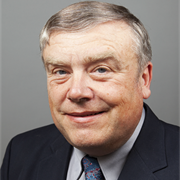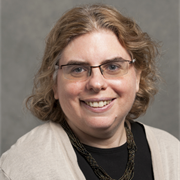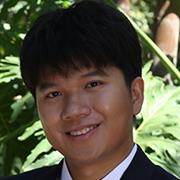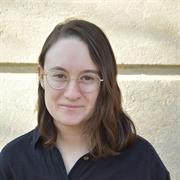Computer Engineering
Spring: Sep 15
Summer: n/a
Part-time (Daytime)
Overview
The Computer Engineering master's program trains students to design hardware, software, and networking systems for the computers of today and tomorrow.
Scholarships Available
Some School of Engineering master's and certificate programs offer scholarships to qualified students. To receive full consideration, be sure to complete your application before the submission deadline. Contact the Office of Graduate Admissions at gradadmissions@tufts.edu for more information.
Program Highlights
Jointly administered by the Department of Electrical and Computer Engineering and Department of Computer Science, this master's program incorporates research and teaching across disciplines to provide students with a well-rounded approach to the dynamic field of computer engineering.
Students personalize their path of study and regularly access professors both in small classes and out of class. At least four lecture-based courses must be taken from a published list of computer engineering core courses. From these core courses, at least one course must be taken from each of the following three core areas:
- Computer Networking
- Computer Architecture
- Computer Software/Systems
Master's degrees require a minimum of 30 credits hours and the fulfillment of at least 10 courses at the 100-level or above with grades of S (satisfactory) or at least a B-.
Graduate Cooperative Education (Co-Op) Program
The School of Engineering's Graduate Cooperative Education (Co-Op) Program provides students with the opportunity to apply the theoretical principles they have learned in their coursework to real-world engineering projects. Gain up to six months of full-time work experience, build your resume, and develop a competitive advantage for post-graduation employment. Learn more about the Co-Op Program.
Program Outcomes
Computer hardware is now being designed with specialized computer cores for specific applications. Computing devices are connected to complex computer networks and the internet, whether they are large servers in a cloud, or embedded Internet-of-Things devices. With software and hardware systems gaining in complexity, computers and designers must go beyond functional correctness and be concerned with power consumption, security, and reliability.
The program gives students a unique perspective on how electrical and computer technology can be used to solve important human problems. With expert faculty, cutting-edge research, and innovative facilities, our students are given the opportunity and resources to make significant contributions to the field and become leaders in industry, government, and academia.
Application Requirements
- Application Fee
- Resume/CV
- Personal Statement
- Transcripts
- Three letters of recommendation
- Official GRE scores (if applicable)
- GRE General Test scores not required for applicants who will have received a degree from a U.S. institution by time of enrollment. GRE scores required for all other applicants.
- Official TOEFL, IELTS, or Duolingo test scores (if applicable)
- Portfolio (optional)
Tuition & Financial Aid
At Tufts University, we believe every qualified applicant deserves the opportunity to pursue graduate study. We are dedicated to helping you understand your financial options and to ensuring that graduate education at Tufts is both accessible and within reach.
Tuition costs for this graduate program are billed at a per credit rate:
| Estimated Tuition for MS Program | |
|---|---|
| Tuition* | $1,799 per credit |
| Total Credits Required | 30 |
| Enrollment Status | Full-Time: 3-4 courses per semester (9-12 credits) Part-Time: 1-2 courses per semester (3-6 credits) |
| Estimated Tuition per Semester | Full-Time: $16,191 - $21,588 per semester (9-12 credits) Part-Time: $5,397 - $10,794 per semester (3-6 credits) |
| Estimated Total Tuition* | $53,970 |
*Estimated based on 2025-2026 tuition rates. Rates are subject to change each academic year. For further information about the full cost of attendance, including additional fees and estimated indirect costs (housing, transportation, etc.), please visit Student Financial Services.
The Tufts University School of Engineering offers partial, merit-based tuition scholarships for the majority of our graduate and certificate programs. All applicants are automatically considered for these awards as part of our holistic admissions review process—no separate scholarship application or additional materials are required.
Additional funding opportunities may include Tufts Double Jumbo Scholarships for Tufts graduates, Bridge Program Scholarships for students and alumni from select partner institutions, and veteran and military education benefits for eligible service members and their dependents, including participation in the Yellow Ribbon Program.
To further support your investment in a Tufts graduate education, a range of financing options are available, including federal and private student loans. For more details, please visit our Graduate Financial Aid page.
Career Outcomes

Average Salary: $138K+
Projected Job Growth (2022-2032): 5%
*Sources: Average salary and projected job growth statistics are from the U.S. Bureau of Labor Statistics Occupational Outlook Handbook.
Faculty

Soha Hassoun

Soha Hassoun
Research/Areas of Interest: Machine Learning for Systems Biology; Metabolic Engineering, computer-aided design for integrated circuits

Mark Hempstead

Mark Hempstead
Research/Areas of Interest: computer architecture, computer systems, power-aware computing, embedded systems, mobile computing, computer systems for machine learning, workload characterization, quantum computing, learning sciences and computer systems for human subjects research

Alva Couch

Alva Couch
Research/Areas of Interest: data science, software systems engineering, performance analysis, system, network, and data management

Lenore Cowen

Lenore Cowen
Research/Areas of Interest: computational molecular biology, data science, graph algorithms, network science, discrete mathematics

Marco Donato

Marco Donato
Research/Areas of Interest: emerging technologies, non-volatile memories, SoC design, hardware for machine learning, noise modeling and reliability

Valencia Koomson

Valencia Koomson
Research/Areas of Interest: design of silicon-based mixed-mode VLSI systems (analog, digital, RF, optical), analog signal processing, and optoelectronic system-on-chip modeling and integration for applications in optical wireless communication and biomedical imaging

Yingjie Lao

Yingjie Lao
Research/Areas of Interest: trusted AI, hardware security, electronic design automation, VLSI architectures for machine learning and emerging cryptographic systems, and AI for healthcare and biomedical applications.

Peter Lu

Peter Lu
Research/Areas of Interest: Scientific machine learning: physics-informed ML, representation learning, generative modeling, interpretability; Complex systems: nonlinear dynamics, chaos, interacting quantum systems, materials science, fluid turbulence Website: https://petery.lu

Aseema Mohanty

Aseema Mohanty
Research/Areas of Interest: nanophotonics, optical beam shaping, neuroengineering, chip-scale imaging and microscopy, quantum information systems Research Website: https://sites.tufts.edu/amohanty/

Karen Panetta

Karen Panetta
Research/Areas of Interest: Signal processing; image processing; simulation modeling

Corey White

Corey White
Research/Areas of Interest: (opto)electronics and photonics, compound semiconductors, emerging materials, epitaxial growth, hetero- and nano-structures, applications in sensing, integrated photonics, and quantum information systems